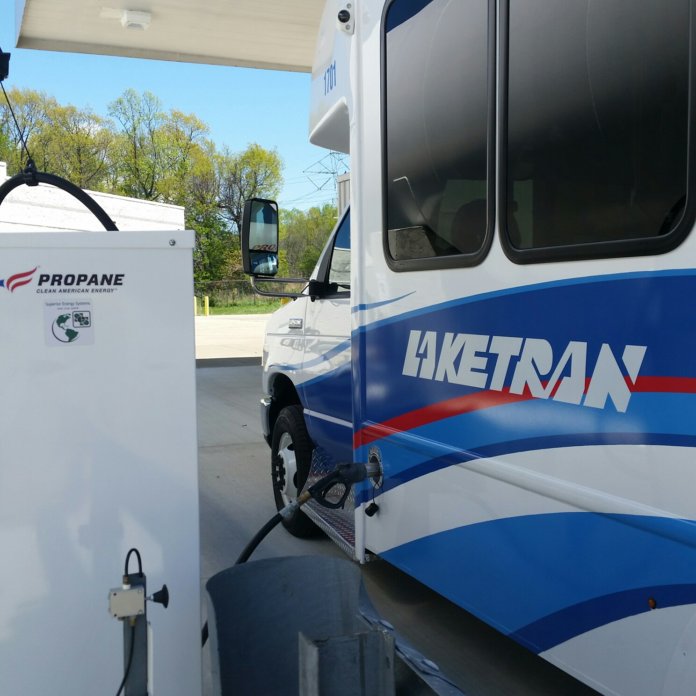Officials from Laketran, the regional public transportation system in Lake County, Ohio; elected officials; and community representatives gathered together on May 9 to commemorate a new 30,000-gallon propane autogas fueling station and public transit bus fleet making its debut on Laketran’s Dial-a-Ride service.
According to the transit system, the $1.6 million infrastructure investment will bring long-term environmental and economic benefit to both Laketran and Lake County.
“Tightening standards for emissions and shrinking budgets have been driving the transportation industry toward alternative fuels now more than ever before,” says Ben Capelle, Laketran’s deputy general manager. “Laketran is always looking for more efficient ways to operate and reduce cost. Right now, it costs about $64 a day per vehicle to fuel a Dial-a-Ride bus on diesel. We will reduce the cost to about $40 a day per vehicle running on propane.”
As reported, the three-phase capital project included engineering, construction of the fueling station and installation of indoor propane detectors for safety inside Laketran’s 122,000-square-foot vehicle storage and maintenance area.
Mentor-based CT Consultants led the engineering effort, and the construction of the fueling station was completed by Superior Energy Systems, based in Columbia Station, Ohio. The station features PRO-Vend 1000 single-hose and PRO-Vend 1500 dual-hose dispensers, incorporating new technology such as mass flow meters, which virtually eliminate unaccounted fuel that slips through the moving parts of mechanical meters.
Laketran says it was able to capitalize on federal funding opportunities used to incentivize transit systems that use alternative fuels to help the community attain air quality standards. In northeast Ohio, the Northeast Ohio Areawide Coordinating Agency administers Federal Transportation Administration (FTA) grant funds and tracks air quality to build sustainable transportation infrastructure throughout the region that enhances air quality.
Laketran would not be able to make this transition or maintain its Dial-a-Ride fleet without the support of federal funding. A $416,000 federal investment from the FTA’s Bus and Bus Facilities grant and a $754,000 Congestion Mitigation Air Quality federal grant fund paid for 80% of the cost of the fueling station and vehicles. Laketran provided a local 20% match funded by the agency’s 0.25% local sales tax revenue.
While the agency expects to reduce air pollutants, the low cost and stability of propane fuel help manage costs during a time when the demand of service continues to grow.
“We are seeing more diverse needs among seniors and people with disabilities riding our Dial-a-Ride service. The new propane fleet will allow us to dispatch a bus that is most efficient and meets the needs of our customers,” says Capelle.
The new fleet is made up of VT3 and Terra Transit buses that seat either eight or 10 passengers and can accommodate up to three wheelchairs. The entire fleet is ADA-accessible, and each bus is equipped with a wheelchair lift, fold-up seats to accommodate wheelchairs, slip-resistant flooring, an electronic transit door, and a central heating and cooling unit in response to customer concerns about vehicles being too hot or too cold.
In addition to the fuel savings, a propane bus costs about $6,000 less than current diesel, and maintenance is less expensive compared with other alternatives.
At the celebration at Laketran headquarters in Painesville Township, Ohio, Laketran discussed the need to increase its demand response fleet size from 80 buses operated a year ago to possibly 85 buses by the end of 2018.
“We’re really proud of this investment. Not only does the fuel savings allow us to recover the initial infrastructure costs in just four-and-a-half years, but we are putting a clean and healthier product on the streets for the residents of Lake County,” comments Brian Falkowski, board president of Laketran.
The new Laketran buses are expected to serve nearly 300,000 annual Dial-a-Ride riders, guaranteeing access to work, medical appointments, local shopping, education and recreation throughout Lake County.






